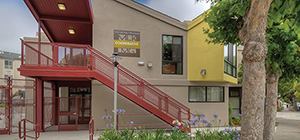KING-GARVEY CO-OP APTS.
LOCATION: San Francisco
DEVELOPER: Related California
THE DEAL: $41 million renovation of ’60s-era co-op
THE FINANCING: $5 million San Francisco Redevelopment Agency loan; $36 million construction loan issued by Citi Community Capital and backed by Freddie Mac as a permanent lender THE PLAN: Renovate the property’s 211 units and common areas, including a community center and park plaza
Like a lot of things born in 1960s San Francisco, the Martin Luther King-Marcus Garvey Square Cooperative Apartments had lost some serious luster by the turn of the new century, even if the community’s original mission of providing homeownership opportunities to low-income Fillmore neighborhood denizens has remained critical in a have-vs.-have-not real estate market.
Plagued by management challenges, eternally deferred maintenance, and a lack of capital reserves for property improvements, the community was in such serious disrepair by 2006 that HUD was threatening to pull Section 8 rental assistance from the property. “That wasn’t a mean-spirited move by HUD; it was simply an ”˜I give up’ scenario,” says Bill Witte, CEO and president of Related California.
Enter San Francisco politicos then-mayor Gavin Newsome and U.S. Rep. Nancy Pelosi, and King- Garvey’s prospects turned from HUD-induced foreclosure to cause célèbre. By 2008, the search was on for partners that would help develop a master plan, secure funding, and manage a major renovation. When Related California signed on to the three-year, $41 million renovation plan, joining forces with HUD, Citi Community Capital, the San Francisco Redevelopment Agency (SFRA), and Freddie Mac, rehab was penciled out at $100,000 per unit and included dealing with water intrusion and mold. “It was a big job of accumulated disrepair, not just your typical paint and patch,” Witte says. “It required a lot of parties to go beyond what they’d normally do.”
Indeed, the community’s co-op status—in which each tenant builds an equity ownership share in the property over the course of his or her residency—made financing the renovation sticky. While HUD provides Section 8 assistance, lowincome housing tax credits did not easily apply to the project because it technically doesn’t operate as a rental community. “You don’t just buy the building and tell the renters what to do,” Witte says. “The residents are shareholders, and they retained us as a sort of fee-developer financier to make this happen.”
Key to getting to the community’s grand re-opening in July was an initial $5 million seed loan made by the SFRA, which allowed Related to secure Citi Community Capital as the construction lender. Together, the partners leveraged the $5 million as an equity chunk along with their name recognition to get Freddie Mac involved as the permanent lender. Related guaranteed completion of the renovations as well as repayment of $6.5 million of the $36 million loan balance.
This willing attitude delivered King-Garvey a new laundry building; a community center and day care; two playgrounds; increased security; and the complete renovation of all 211 units, including new finishes, appliances, and fixtures.
“Think about that,” Witte says. “[Freddie] made a loan to a lowincome, limited-equity co-op board. Yes, we guaranteed completion of the work, but over the next 10 to 15 years, the property is going to have to hold together. Sometimes I think we are the patron saint of lost causes, but it’s also precisely when situations become so dire that you know something has to get done.”
